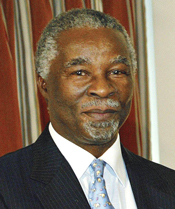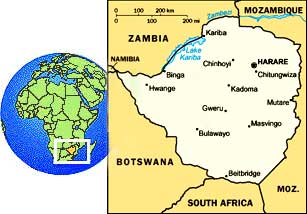
(FinalCall.com) – During a recent speech at the University of South Africa, former President Thabo Mbeki took Western nations to task for mounting an “offensive against Zimbabwe” that he called an indirect attack on the aspirations of all Africans.
During his speech, after attending President Robert Mugabe’s inauguration in Zimbabwe, he focused on criticisms about the outcome of the Zimbabwe election and Zimbabwe’s role as a catalyst in a war to remove vestiges of neo-colonialism from Africa.
“I wasn’t intending to speak for so long, but as you can see I’m getting very, very agitated about Zimbabwe, because it’s very, very clear that the offensive against Zimbabwe is an offensive against the rest of the continent,” he said.
Concerning the election outcome, Mr. Mbeki noted that based on over 1,000 election monitors provided by the African Union and the South African Development Community (SADC) the polling was “free, representing the opinion of the people of Zimbabwe.”

So why did Western nations, including the U.S., claim the election outcome was deliberately slanted to favor Mugabe? John Kerry, U.S. secretary of state, declared the “United States does not believe the results … represent a credible expression of the will of the Zimbabwean people.”
But a closer look reveals Western election observers were not even invited. In fact Zimbabwe, who Western nations have sanctioned, felt Western “observers” couldn’t objectively serve as monitors.
In addition, the U.S. had offered to pay “huge” sums of money to the SADC observer mission. According to Mbeki, who said he spoke to members of the observer mission, “We don’t know how they got to know that we were going to do this, but they were very, very happy to support us with huge sums of money. But we said no. We refused. We said no, we will finance ourselves.” There was a clear reason why SADC decided against accepting outside financing, according to what Mbeki was told. “Because we know that if we accepted that money, then we would have to produce a report consistent with the views of the paymaster,” he said.
In the October 9, 2013 edition of The Guardian, film maker Roy Agyemang writes 89-year-old Mugabe was “molded in the crucible of politics of nationalism, he emerges as the surviving face of African nationalism radicalized through armed resistance to settler colonialism. It is in this dimension of his generational politics, this trait of his character, which Britain and the western world has not been able to comprehend.”

I might add, as Mbeki suggests, that there is also fear of what Mugabe represents. What they fear from Mugabe, who spearheaded the 1980 overthrow of Zimbabwe’s former colonial masters, if what he represents catches momentum, is that their days of exploiting Africa’s natural resources are numbered.
Belgium, the center of the global diamond trade, reported Voice of America, has demanded that the European Union lift sanctions on the state-run Zimbabwe Mining Development Corporation (ZMDC).
The EU has announced plans to lift sanctions imposed on ZMDC. Why? Zimbabwe is on the verge of accounting for 25 percent of world diamond production, Mugabe noted at a conference at Victoria Falls last year. He noted the whole industrialized world seems to be “here” in his country and a representative of India told him why.
Mugabe, during his September speech to the United Nations General Assembly castigated the U.S. and Great Britain. “Shame, shame, shame to the United States of America. Shame, shame, shame to Britain and its allies … Zimbabwe is for Zimbabweans, so are its resources. Please remove your illegal and filthy sanctions from my peaceful country,” he said.

The U.S. and the EU have imposed sanctions on Zimbabwean state firms and travel restrictions on Mugabe and dozens of Zimbabweans, mostly members of Mugabe’s Zanu-PF political party. The sanctions imposed on Zimbabwe are mostly about Mugabe’s redistribution of land forcibly taken by the country’s former colonial masters. In fact much of this illegal land distribution was a way of rewarding British citizens for service to the UK during World War II.
Ayemang who is the director/producer of the documentary “Mugabe: Villain or Hero?” said, “From Margaret Thatcher’s grudging acknowledgement to Tony Blair’s open hostility, the British establishment has had to contend with the assertive Mugabe.”
Mbeki believes Zimbabwe has been the “frontline in terms of defending our right as Africans to determine our future, and they are paying a price for that. I think it is our responsibility as African intellectuals to join them.”
South Africans are still suffering from the results of the 1913 Land Act that saw millions of Blacks forcibly removed from their homes. This injustice has yet to be rectified. Maybe Mugabe sees Zimbabwe redistributing land back to indigenous Africans as a precursor for South Africa’s future.
Jehron Muhammad, who writes from Philadelphia, can be reached at [email protected].












